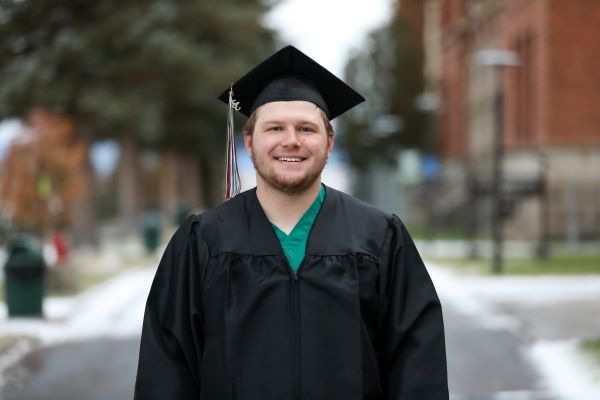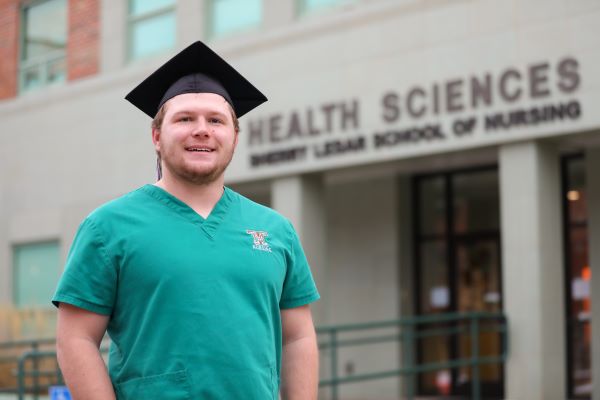Nursing grad follows in mom’s footsteps to deliver healthcare to southwestern Montana

Dylan Skocilich’s earliest memories of Montana Tech date back to when he was in preschool. His mom, Nora Schillo, PMHNP-BC, would bring him with her to the library at that time, as she worked her way through a nursing degree.
Skocilich watched his mom’s career play a transformative role in his family’s life. When he was younger, the family had few means, and lived in public housing. Over the years, his mother got her bachelor’s degree in nursing, and master’s degree to become a psychiatric mental health provider. His younger siblings grew up without experiencing what those earlier years were like. Yet Skocilich is grateful for that time, because it gave him an understanding of what it’s like to be judged for not having as many resources as others do. That experience allows him to make sure the clients he works with never feel that kind of judgment.
“It’s really important to meet the client where they are and ensure we present options that provide holistic and culturally relevant care. You want to build a healthy relationship with the patient, and that trust. You want them to feel understood for who they are,” Skocilich said.
Skocilich will graduate with his bachelor of science in nursing on Dec. 9.

Despite the familial tie to the program, Skocilich never would have guessed he would choose nursing as a major.
“Everyone was kind of shocked I went into nursing,” Skocilich said. “Everyone pictured me going into the trades. I love working with my hands and being outdoors, but I almost felt like there was a calling to do something more self-fulfilling by serving others. I wouldn’t be able to do so if I didn’t have this background in nursing. It’s just a wonderful career that provides endless opportunities.”
The Montana Tech nursing faculty believes the field is an excellent fit for Skocilich.
"Dylan is so easy to talk to and one of the most empathetic people I have ever met,” Assistant Professor Kristin Cullen said.
Cullen remembered a complicated patient, in clinical, who did not want to ambulate. The patient needed to ambulate to help raise their oxygen levels.
She remembered a complicated patient, who did not want to go for walks, though they were needed to raise the patient’s oxygen levels.
“Dylan connected with the patient by talking to her about the crafts that she was doing while in bed and took the time to get to know her,” Cullen said. “The next thing you know, she was walking the halls with him. The world needs nurses like Dylan! His genuine, authentic nature will be an asset to him throughout his career. Dylan is also accountable, has an exceptional work ethic, is eager to help others, and is fun to converse with.”
Assistant Professor Megan Rediske knows Skocilich and his mom. She remembers him as a great Anaconda Copperhead football player, and says his growth in the nursing field continues to make him an excellent role model for his siblings and the youth of Anaconda.
"Dylan is an extremely kind and thoughtful student,” Rediske said. “As a pre-nursing student, he contacted faculty to be proactive in building great professional relationships with us. This was not superficial networking, but a genuine interest in who we were as his faculty. I have been able to see him grow in his nursing education, while maintaining a smile. These practical new skills and innate compassion make him a great Oredigger and a future nurse."
Skocilich feels prepared to enter the field.
“The program itself is extremely challenging but it’s also very rewarding,” Skocilich said. “I don’t think some understand the relationships you build in this program, unless you go through it.”
Nursing school is tough. Students are expected to take several rigorous pre-requisite courses including anatomy and physiology, chemistry, statistics, medical philosophy and ethics and microbiology, before entering the upper division of the program, which focuses on pharmacology, and nursing skills for specific populations, including adults, children, elderly, and those who are pregnant. When students have clinical placement at the hospital, they often work odd hours at different facilities.
“You have to build your schedule around school and make various sacrifices to be successful,” Skocilich notes.
Skocilich worked a full-time job around the scheduling demands to pay his way through college, and served as many terms of service as possible with AmeriCorps’s Campus Compact program, where he supported younger K-12 students. He had to learn better study habits to meet the demands of college, and master time management to fit everything into his schedule.
“I was never a straight A student, I always struggled in high school,” Skocilich said. “Tech provided that little bump that made me truly enjoy my academics. I was lucky to find supportive professors in the nursing program that provided the resources and help I needed to achieve my full potential.”
In addition to balancing work and school, Skocilich also had to deal with loss and adjustment to becoming a caregiver during his time in the nursing program. Midway through, one of Skocilich’s biggest supporters, his grandmother, passed away unexpectedly from a heart attack, leaving his 77-year-old grandfather alone.
Skocilich lives a half block away, and stepped up to care for him.
“It’s hard for people to understand what goes into taking care of someone unless you’ve done it, but I would like to remind people in that position to take care of yourself as well,” Skocilich said.
Skocilich says he’s grateful for the nursing instructors who helped him study, and his girlfriend, Johannah Forsberg (BSN, ’23), who helped him through the process.
“I don’t think I could have done it without her, or the wonderful professors here at Tech,” Skocilich said.
His student experience included lessons that were negatively impacted by the pandemic. Some of the local assisted living facilities were locked down when Skocilich typically would have had clinical experiences there. The limitations were counterbalanced by the opening of the Lesar Family Nursing Simulation Center in January 2022.
“The mannequins are very realistic,” Skocilich said. “You can feel their pulses and objectively measure their vital signs. It provides a safe and open environment that is fun to learn in. Kathy, Stacy, and the laboratory assistant Dawn put in a lot of work to provide realistic simulation scenarios that have been applicable in practice.”
Skocilich plans to work in the medical-surgical unit at Community Hospital of Anaconda after graduation. He has interests in a few specialties, but for now he wants to work close to home to be able to continue caring for his grandpa.
He has some advice for students considering a healthcare career.
“It’s important to be humble,” Skocilich says. “It’s not just about knowing the right answer every time. It’s accepting what we can do to help the person make the best of their condition or situation, while also providing the care that they want that’s culturally sensitive. Additionally, always try to have a personable conversation because the little things can make the biggest differences.”
The most important thing is never to give up on reaching a goal.
“There were many times I considered dropping out,” Skocilich said. “It doesn’t matter who you are or where you come from, or what your beliefs are, you can achieve it through perseverance if you have your mind set on it. Sometimes the things you fear the most are the most rewarding in the end.”